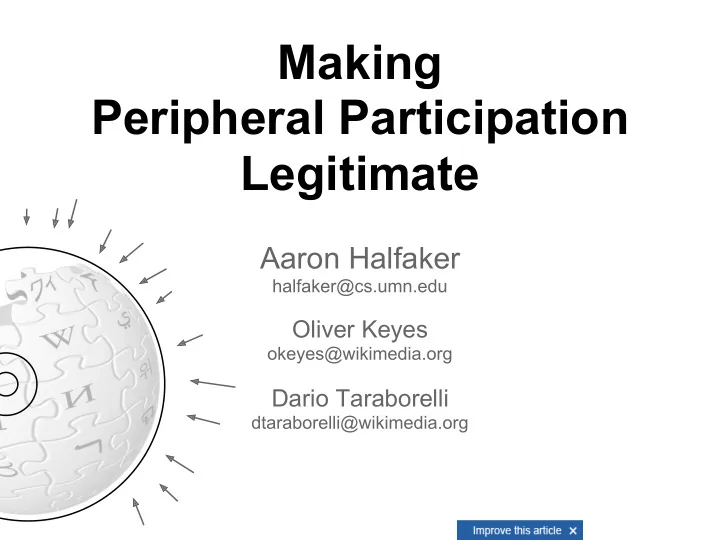

Making Peripheral Participation Legitimate Aaron Halfaker halfaker@cs.umn.edu Oliver Keyes okeyes@wikimedia.org Dario Taraborelli dtaraborelli@wikimedia.org
Wikipedia's scale
Wikipedia's scale Planet Earth (6.97 billion) Data from March 2012
Wikipedia's scale Planet Earth (6.97 billion) Monthly Wikipedia Readers (1.47 billion) Data from March 2012
Wikipedia's scale Planet Earth (6.97 billion) Monthly Wikipedia Readers (1.47 billion) Monthly Wikipedia editors (113,304) Data from March 2012
The Powerlaw of Participation Wilkinson, D. Strong regularities in online peer production. In Ecommerce ’ 08, ACM (2008), 302–309
Wikipedia as a system Users' time Wikipedia & energy
Wikipedia as a system Users' time Wikipedia & energy Monthly Wikipedia Readers (1.47 billion)
Legitimate Peripheral Participation Lave & Wenger Situated learning: Legitimate peripheral participation. Cambridge University Press, 1991. How do newcomers enter communities of practice? "Community of Practice"?
Legitimate Peripheral Participation ● A group of people with a specific skill. ● Newcomers seek to gain skills and enter community
Legitimate Peripheral Participation Newcomer Community of people doing a thing
Legitimate Peripheral Participation Newcomer Community of people doing a thing
Legitimate Peripheral Participation Newcomer Community of people doing a thing
Legitimate Peripheral Participation Newcomer Newcomer evaluates community. Community evaluates newcomer. Community of people doing a thing
Legitimate Peripheral Participation 1. Simple 2. Low risk 3. Productive
Legitimate Peripheral Participation 1. Simple 2. Low risk 3. Productive Becoming Wikipedian - Bryant, Forte & Bruckman, GROUP'05 At the periphery of Wikipedia, novice users contribute by reading articles out of interest, noting mistakes or omissions, and correcting them.
Wikipedia's changed since 2005 Newcomers' first edits ● More complex ● Higher risk of failure
Difficulty of first edit increasing. Halfaker, A., Gieger, R. S., Morgan, J., & Riedl, J. (in-press). The Rise and Decline of an Open Collaboration System : How Wikipedia's reaction to sudden popularity is causing its decline. American Behavioral Scientist
8
12
8
11
13
Wikipedia's policy on verifiability. 1366 x 5878 px
What do? Extend the periphery with: ● Simple ● Low risk ● Productive
● Simple ● Low risk ● Productive?
The Article Feedback Tool
The Article Feedback Tool 3 experiments ● 1% sample of articles ● Forms #1, #2 and #3 ○ Dec 27th 2011 - Jan 24th 2012 ■ Sampled 4353 submissions
The Article Feedback Tool 3 experiments ● 1% sample of articles ● Forms #1, #2 and #3 ○ Dec 27th 2011 - Jan 24th 2012 ■ Sampled 4353 submissions ● Prominent links A and E ○ Apr 5th - 19th 2012 ■ Sampled 3710 submissions
The Article Feedback Tool 3 experiments ● 1% sample of articles ● Forms #1, #2 and #3 ○ Dec 27th 2011 - Jan 24th 2012 ■ Sampled 4353 submissions ● Prominent links A and E ○ Apr 5th - 19th 2012 ■ Sampled 3710 submissions ● Call to action form #4 ○ Apr 27th - May 7th 2012 ■ Sampled all new editors
The Article Feedback Tool 3 experiments ● 1% sample of articles ● Forms #1, #2 and #3 ○ Dec 27th 2011 - Jan 24th 2012 ■ Sampled 4353 submissions ● Prominent links A and E Feedback quality: ○ Hand-coders: 20 Wikipedians Apr 5th - 19th 2012 ● Categorized feedback ■ Sampled 3710 submissions ● Rated for usefulness ● Call to action form #4 New editor productivity: ○ Apr 27th - May 7th 2012 Inferred from reverts ● ■ Sampled all new editors
Overview of Results RQ1: How does the request affect the quantity and quality of feedback? Quantity Quality Readers' Editors' concerns concerns
Overview of Results 1. "Did you find what you were looking for?" ○ Boost contribution rate by 45% over asking for rating ○ No loss in usefulness submissions condition
Overview of Results RQ2: How does prominence affect the quality and quantity of feedback? Quantity Quality Prominent Bottom of article
Overview of Results 2. Prominent button asking for feedback ○ Boost contribution rate by 108% ○ No loss in usefulness submissions A improve this article E condition
Overview of Results RQ3: How does the presence of the feedback form effect new editor conversion? ● could cannibalize primary contributions (edits) ● could be a stepping stone
Overview of Results 3. Invitation to edit after feedback submission ○ Boost new editor conversions by 151% ○ 20% drop in productivity*
Conclusions ● No tradeoff between quantity and quality of participation ○ Rick Wash and Cliff Lampe. “ The Power of the Ask in Social Media ” Proceedings of the ACM Conference on Computer Supported Cooperative Work (CSCW) . Seattle, WA. February 2012.
Conclusions ● No tradeoff between quantity and quality of participation ○ Rick Wash and Cliff Lampe. “ The Power of the Ask in Social Media ” Proceedings of the ACM Conference on Computer Supported Cooperative Work (CSCW) . Seattle, WA. February 2012. ● Inviting readers to covert ○ Increases the rate of new editors ○ But at a lower success rate ○ Anti-vandalism tools negated cost to community
Conclusions ● No tradeoff between quantity and quality of participation ○ Rick Wash and Cliff Lampe. “ The Power of the Ask in Social Media ” Proceedings of the ACM Conference on Computer Supported Cooperative Work (CSCW) . Seattle, WA. February 2012. ● Inviting readers to covert ○ Increases the rate of new editors ○ But at a lower success rate ○ Anti-vandalism tools negated cost to community ● Balance: contribution vs. cost of moderation
Conclusions Value of Cost of Value to - = Contribution Moderation Community
Conclusions Value of Cost of Value to - = Contribution Moderation Community If you get this wrong, it's not going to work. E.g. this
Thank you! Aaron Halfaker http://halfaker.info Funded by NSF IIS 09-68483 and IIS 11-11201 Thanks to our Wikipedian volunteers: Salim Fadhley, Fluffernutter, GorillaWarfare, Adam Hyland, Jamietw, John Minthorne, Tom Morris, Osarius, Rohit Patnaik, Utar and Whiteguru.
Now everyone look at Dario WE WANT YOU... FOR SCIENCE ● Machine learning --> feedback moderation ● Predictive models --> new editors ● Cultural and language barriers to participation ● etc.
Recommend
More recommend